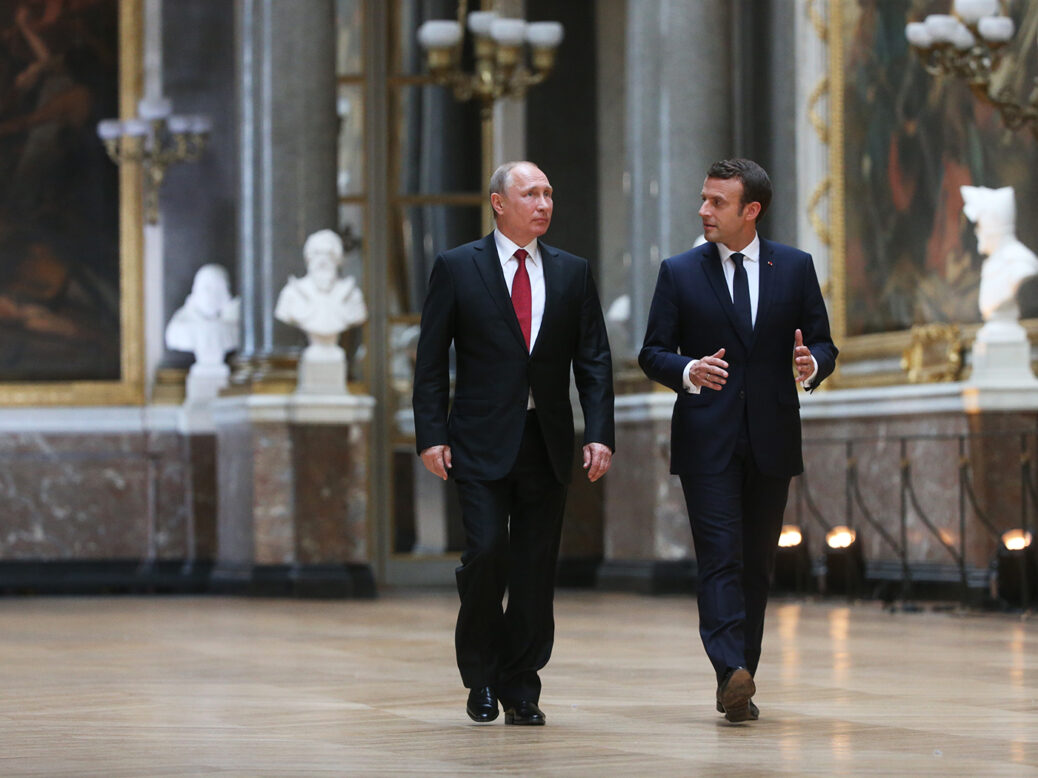
BERLIN – France’s worst-kept secret is out: Emmanuel Macron is seeking a second term as President of France. The incumbent announced his run at almost the last moment, on the evening of 3 March, when the deadline for candidates to declare was the following day with the first round of voting on 10 April.
Plans for flashy re-election events, including a rally in Marseille on 5 March, have been heavily toned down by the president’s team following Russia’s invasion of Ukraine. The campaign for the election, despite being just five weeks away, has barely featured in the news since the war began.
Many in Paris now believe that Macron, already the favourite in this election, will walk it. His four primary competitors are tainted, to varying degrees, by fondness for or links to Vladimir Putin.
On the far right, that closeness ranges from the chumminess of Marine Le Pen, who had to pulp more than a million leaflets which featured a photograph of her shaking hands with the Russian president, to Éric Zemmour’s consistently overgenerous reading of Russia’s intentions on TV, now replayed in embarrassing social media clips. Jean-Luc Mélenchon, the far-left candidate, has in the past expressed a desire for closer relations with Russia and blamed Nato enlargement for tensions in Ukraine.
Any space there was in France for pro-Russian politics has almost completely closed. Seventy-four per cent of public opinion is sympathetic to Ukraine, while only 3 per cent of people support Russia and 23 per cent don’t know, according to a recent Ifop poll. “Pro-Russia candidates are boxed in right now,” Tara Varma, head of the Paris office of the European Council on Foreign Relations, said.
Valérie Pécresse, the candidate of the centre-right Republicans, has been sliding in the polls. She is not directly tainted by association with Russia but her party’s candidate at the last presidential election, François Fillon, was forced to quit his positions on the board of two Russian energy companies.
In any case, all four challengers to Macron are distinctly inexperienced in what is certain to be a foreign policy focused election. Pécresse is the only one to have held ministerial office but has been hampered by embarrassing foreign policy gaffes, such as recently calling for the expulsion of Mali’s ambassador to France, even though the post had been vacant for two years.
[See also: Éric Zemmour and the French far right’s gender gap]
All the while, Macron has stayed above the fray, playing a leading role in the futile pre-invasion push to deter Russia from invading Ukraine and subsequently co-ordinating the European response to the crisis. He has emerged as Putin’s favourite interlocutor, speaking more regularly to his Russian counterpart both before and after the invasion than almost any other world leader.
Macron has not been flawless on Russia. On 8 February he triumphantly announced that Putin had promised him that Moscow “would not escalate” tensions, two weeks before Putin gave the order to invade. “He was shocked by Putin’s betrayal,” Varma said. Macron’s naivety regarding Putin’s intentions could plausibly have hurt him in the campaign, but he needed to prove that all the avenues for diplomacy had been exhausted before the war and subsequent sanctions on Moscow, which will hurt Europe as well as Russia.
“French voters are unlikely to replace the captain in the middle of the storm, in a crisis that has stirred much emotion in France and Europe,” said Benjamin Haddad of the Atlantic Council think tank. “But let’s be cautious, the world is very different from a week ago and could be very different in four weeks.”
[See also: Nuclear power is the French election’s hot topic]






